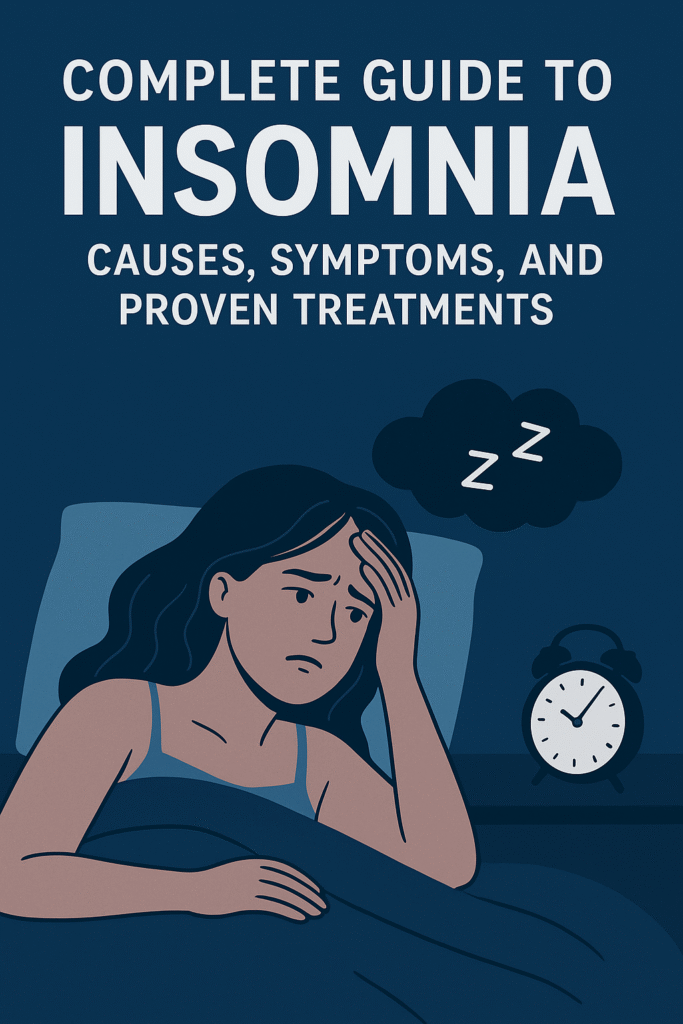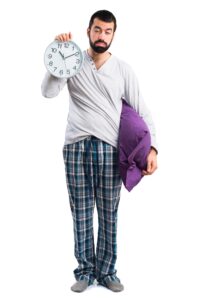
⚠️ Affiliate Disclaimer: This post may contain affiliate links, which means I may earn a small commission — at no extra cost to you — if you make a purchase through one of these links. I only recommend products or services I genuinely trust and believe can provide value. Thank you for supporting My Medical Muse!
Complete Guide to Insomnia: 14 Proven Sections for Causes, Symptoms & Treatments
Complete Guide to Insomnia: Causes, Symptoms, and Proven Treatments
Insomnia is not just an occasional restless night, it is one of the most prevalent sleep disorders worldwide, affecting both physical and mental health. When sleep becomes consistently disrupted, the consequences extend far beyond tiredness. Chronic insomnia contributes to fatigue, impaired concentration, mood instability, weakened immune function, and an elevated risk of conditions such as hypertension, diabetes, and depression.
This guide provides a detailed, evidence-based overview of insomnia: its underlying causes, hallmark symptoms, and the most effective treatments available today. Whether you are struggling with short-term sleeplessness or long-standing sleep difficulties, the following sections will equip you with the knowledge and strategies to understand, manage, and ultimately overcome insomnia.
Table of Contents:
- What Is Insomnia?
- Types of Insomnia
- How Much Sleep Do We Really Need?
- Causes of Insomnia
- Risk Factors for Insomnia
- Symptoms of Insomnia
- Short-Term vs. Chronic Insomnia: Key Differences
- How Insomnia Affects the Body and Mind
- Diagnosis of Insomnia
- Evidence-Based Treatments for Insomnia
- Prevention: Building Long-Term Healthy Sleep Habits
- When to See a Doctor
- Frequently Asked Questions
- Final Thoughts
What Is Insomnia?
Insomnia is a common sleep disorder defined by persistent difficulty with falling asleep, staying asleep, or waking up earlier than desired and being unable to return to sleep. Unlike the occasional restless night, insomnia is recurrent and disruptive, often impairing daytime functioning.
The American Academy of Sleep Medicine (AASM) outlines insomnia as meeting three key criteria:
- Difficulty initiating or maintaining sleep, despite adequate opportunity to rest.
- Frequency: Symptoms occur at least three nights per week.
- Duration and Impact: The sleep disturbance causes daytime consequences such as fatigue, reduced concentration, irritability, low mood, or decreased work performance.
In essence, insomnia is not just about sleep loss, it is about how that loss spills into waking life, reducing both health and quality of life.
Types of Insomnia
Insomnia is not a one-size-fits-all disorder. Experts classify it by duration and underlying cause:
- Acute Insomnia: Short-term and usually triggered by identifiable stressors such as illness, job pressure, bereavement, or travel. It typically lasts a few nights to several weeks.
- Chronic Insomnia: Persists for three months or longer, with symptoms occurring at least three nights per week. It often requires structured treatment, as it rarely resolves on its own.
- Primary Insomnia: Occurs independently, without being caused by another medical, psychiatric, or environmental condition.
- Secondary (Comorbid) Insomnia: Occurs as a symptom or consequence of another issue, such as depression, anxiety, chronic pain, asthma, or medication side effects.
Understanding the type of insomnia is essential because treatment strategies vary depending on whether the disorder is stand-alone or linked to another condition.
How Much Sleep Do We Really Need?
The amount of sleep required for optimal functioning differs across age groups, but consistent scientific evidence underscores the importance of sufficient and regular sleep. According to the National Sleep Foundation:
- Adults (18-64 years): 7-9 hours per night
- Older Adults (65+ years): 7-8 hours per night
- Teenagers (14-17 years): 8-10 hours per night
Falling short of these targets on a regular basis increases the risk of insomnia and contributes to long-term health problems such as weakened immunity, obesity, cardiovascular disease, and impaired cognitive performance.
In short, quality sleep is not optional, it is a biological necessity as vital as food, water, and exercise.
Causes of Insomnia
Insomnia is rarely caused by a single factor. In most cases, it results from a complex interaction of biological, psychological, and environmental influences. Identifying the root cause or combination of causes is essential for effective treatment.
A. Medical Conditions
Many health problems can interfere with normal sleep:
- Chronic pain disorders such as arthritis, fibromyalgia, or back pain make it difficult to fall and stay asleep.
- Respiratory illnesses including asthma, COPD, and sleep-related breathing disorders disrupt night-time rest.
- Gastroesophageal reflux disease (GERD) may cause discomfort and awakenings.
- Neurological conditions such as Parkinson’s and Alzheimer’s disease are strongly associated with insomnia.
- Cardiovascular disease, including heart failure or arrhythmias, can disturb sleep patterns.
- Hormonal imbalances, especially thyroid disorders and menopause, may lead to disrupted or fragmented sleep.
B. Psychological Factors
Mental health plays a critical role in sleep regulation. Common contributors include:
- Stress from work, finances, or relationships, which heightens nighttime alertness.
- Generalized anxiety disorder, which often manifests as racing thoughts at bedtime.
- Depression and bipolar disorder, where disrupted circadian rhythms and early-morning awakenings are common.
- Post-traumatic stress disorder (PTSD), which may cause nightmares, hypervigilance, and difficulty initiating sleep.
C. Lifestyle & Environmental Triggers
Everyday habits and surroundings can either support or sabotage sleep:
- Irregular sleep schedules, such as those experienced by shift workers or frequent travelers.
- Excessive screen time, where blue light exposure suppresses melatonin production.
- Poor sleep environment, including noise, light, uncomfortable bedding, or a room that is too warm or cold.
- Stimulant and substance use, such as late-day caffeine, nicotine, or alcohol, which interfere with natural sleep architecture.
D. Medications and Substances
Several prescription and over-the-counter medications can disturb sleep:
- Stimulants, including ADHD medications and certain decongestants.
- Corticosteroids, which may cause restlessness and insomnia.
- Antidepressants, especially SSRIs, which can disrupt sleep cycles.
- Blood pressure medications such as beta-blockers, which may suppress melatonin.
- Recreational drugs, including cocaine or amphetamines, which directly stimulate the nervous system.
Risk Factors for Insomnia
While anyone can experience insomnia, certain groups are at greater risk:
- Women: Hormonal fluctuations during the menstrual cycle, pregnancy, and menopause increase susceptibility.
- Older Adults: Aging alters circadian rhythm, reduces deep sleep, and increases the prevalence of chronic conditions.
- Shift Workers: Rotating or night shifts disrupt the body’s natural sleep-wake cycle, often leading to chronic insomnia.
- Individuals with Mental Health Conditions: Anxiety, depression, and PTSD significantly raise the likelihood of persistent insomnia.
- People with a Family History of Insomnia: Genetics appear to play a role, though environmental factors are also important.
- High-Stress Occupations: Professions requiring constant alertness, decision-making, or irregular schedules (e.g., healthcare workers, emergency responders) are particularly vulnerable.
Symptoms of Insomnia
Insomnia manifests both at night and during the day. The most recognized nighttime symptoms include:
- Difficulty falling asleep: taking more than 30 minutes to drift off.
- Frequent awakenings: waking multiple times and struggling to return to sleep.
- Early morning awakenings: waking earlier than intended without feeling refreshed.
But insomnia doesn’t end when morning arrives. Its impact spills over into daytime functioning, leading to:
- Persistent fatigue or daytime sleepiness
- Difficulty concentrating, memory lapses, and poor decision-making
- Mood disturbances, such as irritability, anxiety, or depression
- Reduced performance at work, school, or daily tasks
- Decreased motivation and energy levels
In short, insomnia is not simply a nighttime complaint, it is a 24-hour disorder that affects nearly every aspect of daily life.
Short-Term vs. Chronic Insomnia: Key Differences
Insomnia can be temporary or long-lasting, and the distinction is crucial for treatment:
- Short-Term (Acute) Insomnia
- Typically triggered by temporary stressors such as exams, deadlines, grief, or illness.
- Lasts a few nights up to several weeks.
- Usually resolves when the stressor passes or when sleep routines are restored.
- Chronic Insomnia
- Persists for three months or longer, occurring at least three nights per week.
- Often associated with medical conditions, psychiatric disorders, or ingrained sleep-disrupting behaviors.
- Carries significant long-term health consequences, including increased risk of hypertension, type 2 diabetes, cardiovascular disease, depression, and anxiety.
- Rarely resolves without professional intervention.
Recognizing whether insomnia is short-lived or chronic helps guide both patients and clinicians toward the right management plan.
How Insomnia Affects the Body and Mind
Insomnia is not merely inconvenient it is a serious health issue with widespread consequences:
- Brain & Mental Health: Chronic insomnia raises the risk of anxiety disorders, depression, irritability, and cognitive decline. It also affects memory consolidation and learning.
- Heart & Circulatory System: Persistent sleep disruption is strongly linked to hypertension, irregular heartbeat, heart attack, and stroke.
- Metabolism & Weight: Insufficient sleep alters hormones that regulate hunger and satiety, increases insulin resistance, and contributes to obesity and type 2 diabetes.
- Immune System: Poor sleep impairs immune defenses, making the body more vulnerable to infections and slower to recover.
- Quality of Life: Insomnia decreases productivity, strains relationships, and raises the likelihood of accidents, including motor vehicle crashes and workplace errors.
In other words, insomnia affects every system of the body, making healthy sleep as essential to longevity as diet and exercise.
Diagnosis of Insomnia
Diagnosing insomnia is primarily a clinical process, but several tools help physicians evaluate severity and contributing factors:
- Comprehensive Sleep History: Discussion of bedtime routines, wake times, naps, and lifestyle habits.
- Sleep Diary: A record of sleep/wake patterns, typically kept for two weeks, to identify consistency and triggers.
- Questionnaires: Tools such as the Insomnia Severity Index (ISI) and Epworth Sleepiness Scale measure the impact of symptoms on daily life.
- Polysomnography (Overnight Sleep Study): Used when another sleep disorder (such as sleep apnea, restless leg syndrome, or narcolepsy) is suspected. This test monitors brain waves, breathing, heart rate, and muscle activity during sleep.
A thorough evaluation helps distinguish between primary insomnia and insomnia secondary to other health issues, ensuring treatment targets the underlying cause.
Evidence-Based Treatments for Insomnia
The best treatment for insomnia depends on its severity, duration, and underlying cause. For acute, stress-related insomnia, simple lifestyle adjustments may suffice. Chronic insomnia, however, often requires structured therapy. Below are the most widely supported, evidence-based approaches.
A. Cognitive Behavioral Therapy for Insomnia (CBT-I)
CBT-I is the gold standard treatment for chronic insomnia and is recommended as the first-line therapy by major sleep organizations worldwide. Unlike medications, CBT-I targets the root behavioral and psychological patterns that perpetuate sleeplessness.
Core techniques include:
- Sleep restriction therapy: Limiting the time spent in bed to match actual sleep duration, gradually increasing it as sleep improves.
- Stimulus control: Strengthening the bed sleep connection by using the bed only for sleep and sex, and getting up if unable to sleep within 20 minutes.
- Cognitive restructuring: Identifying and challenging unhelpful beliefs (“I’ll never fall asleep” or “I need 8 hours or tomorrow will be ruined”).
- Relaxation training: Techniques such as deep breathing, progressive muscle relaxation, or guided imagery to reduce pre-sleep arousal.
- Sleep hygiene education:Reinforcing healthy sleep behaviors and environment.
Studies show CBT-I is as effective as medication in the short term, but more effective over the long term, with sustained benefits and no risk of dependency.
B. Medications
While not the first-line treatment, sleep medications may be considered for short-term relief or when CBT-I is not available. These should be prescribed cautiously, ideally alongside behavioral therapy.
- Benzodiazepines (e.g., temazepam, lorazepam): Effective for sleep initiation but carry risks of dependence, tolerance, and next-day grogginess.
- Non-benzodiazepine hypnotics (e.g., zolpidem, eszopiclone, zaleplon): Often called “Z-drugs,” they have fewer side effects than benzodiazepines but still pose risks if misused.
- Melatonin receptor agonists (e.g., ramelteon), Mimic melatonin’s action, helping regulate circadian rhythm without major dependency risks.
- Sedating antidepressants (e.g., trazodone, doxepin), Sometimes prescribed when insomnia coexists with depression or anxiety.
Sleep medications should generally be used for the shortest duration possible. They manage symptoms but do not cure the underlying disorder.
C. Lifestyle & Sleep Hygiene Changes
Good sleep hygiene provides the foundation for all insomnia treatments. These simple but powerful strategies help regulate the body’s natural sleep-wake rhythm:
- Maintain a consistent bedtime and wake time, even on weekends.
- Avoid caffeine, nicotine, and alcohol several hours before bedtime.
- Minimize screen exposure 1-2 hours before sleep, or use blue-light filters.
- Keep the bedroom environment cool, dark, and quiet.
- Reserve the bed for sleep and intimacy only, not for work or entertainment.
- Incorporate regular physical activity, but avoid vigorous exercise within 2-3 hours of bedtime.
- Create a relaxing bedtime routine (reading, warm bath, gentle stretches).
D. Natural Remedies and Complementary Approaches
Some individuals explore natural or integrative options to support sleep. Evidence varies, but several approaches show promise:
- Melatonin supplements: Useful for circadian rhythm disruptions such as jet lag or shift work; less effective for long-term chronic insomnia.
- Magnesium: Plays a role in relaxation and may benefit people with mild insomnia.
- Herbal remedies: Valerian root, chamomile tea, and lavender have modest calming effects, though clinical evidence is mixed.
- Mind-body practices: Yoga, meditation, tai chi, and mindfulness training reduce stress and pre-sleep arousal.
- Acupuncture: Some studies suggest improvements in sleep quality, though research remains limited.
These approaches are best viewed as adjuncts to evidence-based treatments like CBT-I and sleep hygiene not replacements.
Prevention: Building Long-Term Healthy Sleep Habits
The most effective way to manage insomnia is often to prevent it from taking hold in the first place. Adopting consistent, healthy sleep practices, sometimes called sleep hygiene can dramatically reduce the risk of developing chronic insomnia.
Key Preventive Strategies:
- Establish a wind-down routine: Signal to your body that it’s time to rest by incorporating calming pre-bed rituals such as light reading, journaling, listening to soft music, or taking a warm bath.
- Manage stress effectively: Chronic stress is one of the strongest triggers for insomnia. Mindfulness meditation, yoga, or cognitive behavioral strategies can reduce nighttime overthinking and anxiety.
- Stay physically active: Regular exercise improves sleep quality, but timing matters. Aim for moderate activity (like brisk walking or cycling) most days, ideally finishing at least 3 hours before bedtime.

Man in pajamas holding clock - Limit naps: Short naps of 20-30 minutes can be refreshing, but longer or late-afternoon naps may interfere with nighttime sleep.
- Watch your diet: Avoid heavy meals, caffeine, alcohol, and nicotine close to bedtime. Instead, opt for light snacks if hungry, such as yogurt, bananas, or nuts, which contain sleep-friendly nutrients.
- Protect your sleep environment: Ensure your bedroom is dark, quiet, and comfortably cool. A supportive mattress and pillow also make a difference in long-term sleep quality.
By weaving these habits into daily life, you create a sleep-friendly foundation that supports both prevention and long-term treatment of insomnia.
When to See a Doctor
Occasional sleep difficulties are common, but persistent insomnia should not be ignored. Professional evaluation is essential when:
- Symptoms persist for more than 3 weeks, despite lifestyle adjustments.
- Daytime functioning is impaired, with noticeable fatigue, poor focus, or mood instability.
- Another sleep disorder is suspected, such as obstructive sleep apnea, restless legs syndrome, or narcolepsy.
- Mental health concerns are present, such as depression, anxiety, or substance use.
A healthcare provider can help identify whether insomnia is primary or secondary to another condition and tailor an appropriate treatment plan.
Frequently Asked Questions (FAQs)
Can insomnia go away on its own?
- Yes. Short-term (acute) insomnia often resolves once the stressor or trigger is removed. However, chronic insomnia usually requires structured treatment, such as CBT-I, to prevent it from becoming long-lasting.
Is melatonin safe to use every night?
- Melatonin supplements are generally safe in the short term and most effective for circadian rhythm disruptions (jet lag, shift work). Long-term daily use should be discussed with a healthcare provider, as research on prolonged safety is still limited.
Can exercise improve sleep?
- Absolutely. Regular, moderate exercise enhances sleep quality by reducing stress and promoting deeper sleep. Avoid vigorous exercise right before bedtime, as it may increase alertness.
Do naps make insomnia worse?
- They can. Long naps (over 30 minutes) or naps taken late in the day may reduce sleep drive at night. If needed, keep naps short (20-30 minutes) and take them earlier in the afternoon.
Can diet affect sleep quality?
Yes. High-sugar foods, heavy meals, alcohol, and caffeine close to bedtime can disrupt sleep. On the other hand, foods rich in tryptophan, magnesium, and melatonin such as turkey, almonds, cherries, and bananas may support better sleep.
Final Thoughts
Insomnia is far more than the occasional sleepless night, it is a multifaceted disorder shaped by stress, lifestyle habits, underlying medical conditions, and mental health challenges. While short-term insomnia often resolves once its trigger is removed, chronic insomnia can have serious, long-lasting effects on physical health, emotional stability, and overall quality of life.
The good news is that insomnia is highly treatable. Cognitive Behavioral Therapy for Insomnia (CBT-I) remains the gold standard, offering lasting relief without the risks associated with long-term medication use. When appropriate, short-term pharmacological options, natural remedies, and complementary therapies can provide additional support. Combined with healthy sleep hygiene, stress management, and consistent daily routines, these approaches help most people restore the ability to sleep soundly.
If you’ve been struggling with persistent insomnia, it’s important not to dismiss it as “just bad sleep.” Professional evaluation and treatment can break the cycle of sleeplessness and safeguard your long-term health. Restful sleep is not a luxury, it is a biological necessity and a cornerstone of physical vitality, mental clarity, and emotional well-being.
👩⚕️ Need Personalized Health Advice?
Get expert guidance tailored to your unique health concerns through MuseCare Consult. Our licensed doctors are here to help you understand your symptoms, medications, and lab results—confidentially and affordably.
👉 Book a MuseCare Consult NowRelated Post You Might Like:
- 15 Powerful Natural Remedies to Improve Sleep Apnea Without CPAP
- Sleep Better with Neuropathy: 14 Doctor-Approved Tips
- 7 Bedtime smoothie for sleep and inflammation
- 9 Early Warning Signs of Chronic Insomnia in Shift Workers (And How to Stop It Fast)
- Melatonin for Chronic Insomnia: 7 Powerful Facts You Must Know
Dr. Ijasusi Bamidele, MBBS (Binzhou Medical University, China), is a medical doctor with 5 years of clinical experience and founder of MyMedicalMuse.com, a subsidiary of Delimann Limited. As a health content writer for audiences in the USA, Canada, and Europe, Dr. Ijasusi helps readers understand complex health conditions, recognize why they have certain symptoms, and apply practical lifestyle modifications to improve well-being




